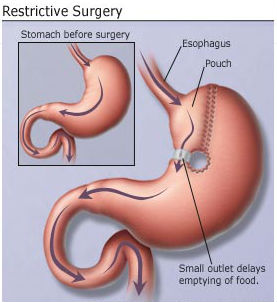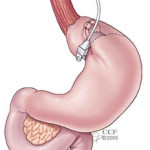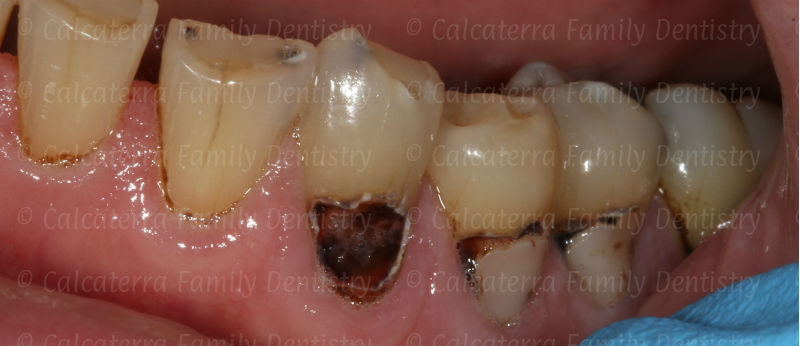
One variation of weight loss surgery. Courtesy WebMD.
We’ll begin this post with a story. It involves one of our patients – we’ll call her Deb.* Deb had weight loss surgery (specifically gastric bypass) approximately two years before coming to our dental office. She did not initially disclose this to us (perhaps out of embarrassment?).
On examining Deb, we noticed significant dental decay on almost all of her teeth. Some of the decay appeared to be from acid – similar to what we see in bulimic patients. Other areas of decay followed the pattern commonly seen in patients with xerostomia (chronic dry mouth).
Her condition was of great concern to us. How could this relatively young woman who appeared to take good care of her teeth have so many dental problems?
We spent significant time trying to figure out why this was happening. She finally told us about the weight loss surgery. It was at this point when everything made sense…
How Bariatric Surgery Works

Gastric Band. Image courtesy ASMBS
Many of you reading this probably know how the procedures work. Some of you may have actually had the procedure and are now researching why you are having dental problems. But either way, a refresher is beneficial.
To summarize, bariatric surgery is a group of similar procedures performed on the stomach. The procedures will accomplish one of two objectives (or both): restrict the amount of food the stomach will hold and/or affect the quantity and quality of nutrients absorbed.
In either case, weight loss follows the procedure, and resolution of many obesity-related conditions ensues. However, a complex set of physiological changes also occur, and in nearly all cases, dental problems emerge as a direct result.
Significant Dental Findings After Weight Loss Surgery
Let’s look at some key findings observed in patients who’ve had the procedures:
- 56% of patients vomit at least once per week six months after the surgery.
- Nearly all patients experience a decrease in the flow of saliva.
- While nearly all obese patients experience GERD (gastroesophageal reflux disease), many patients still have GERD post-surgically. And with the ABG procedure, 33% reported having severe reflux – worse than before the surgery.
- Many patients snack repeatedly throughout the day, leading to a constant barrage of sugar on their teeth and causing an increase in plaque accumulation.
- 37% of patients report eating increased amounts of sugary foods after the surgery than before.

Decay seen on a male patient of ours who had bariatric surgery. He suffered from dry mouth after the procedure. Photos and subsequent dentistry Dr. Nicholas Calcaterra.
So, we basically have a perfect storm here: acid on the teeth due to GERD and vomiting, reduced saliva, increased frequency of eating, and increased sugar consumption.
The end result is an increased rate of dental decay, often requiring fillings, root canals, and sometimes even extractions followed by dentures and/or implants.
What You Should Do?
Tell your dentist (assuming you haven’t done so already)!
In our office, we’ve treated Deb and many others like her who’ve had gastric bypass or other weight loss surgical procedures. We manager each and every case differently, but examples of how we address these challanges include:
- Customized trays to wear at night with high fluoride toothpaste (these are similar to whitening trays people will wear – except that you place fluoride in them instead of whitening gels).
- Acid reflux medications to reduce GERD.
- More frequent dental cleanings.
- Daily use of high fluoride toothpaste such as Prevident.
- Recommend chewing sugarless gum and or candies to increase salivary flow.
If you have had weight loss surgery and are struggling with dental issues, we can help. Call us at (203) 799 – 2929 if you would like to make an appointment.
* Deb’s name was changed due to privacy concerns.

Can our medical insurance pay for any tooth repair do to gastric bypass decaying our teeth!?
Elia,
Thank you for the comment. Every medical and dental insurance plan is different. But, generally speaking, insurance companies are in business to pay as LITTLE money as possible. So it would be very unlikely that a medical insurance company would agree to pay for dental work, even under those circumstances. We’ve never had any success in getting reimbursement in these cases.
THANK YOU so much for this article! I have to say dental issues have never been mentioned at any of the seminars I have attended over the years for various surgeons, and I have to say as a medical professional, this disappoints me because I feel it is purposefully being hidden. I happened to notice on a blog people asking, ” Have you noticed bariatric patients all tend to have yellow teeth?”, then a friend who recently had the surgery mentioned always having bad breath lately. This lead me to Google and I stumbled across horror story after horror story of bariatric patients losing their teeth (surgery patients from 1998 to 2017, no matter which surgery either, and patients of all ages) ! I started to panic and even though I am still VERY concerned, reading your article helped to calm me significantly. I plan to discuss these concerns with my dentist asap to help me make my now better informed decision.
Kenehsia,
Thank you for commenting. While some medical conditions and/or procedures are well known to dentists, there is very little data that is published with respect to dental complications following weight loss surgery. When I was in dental school from 2005 to 2009, there was absolutely no discussion of it. I doubt if any of the professors were aware of this. I highly doubt if it is being discussed now.
I am glad you found the article helpful and are now aware of the risks these individuals face post-surgically.
I had bariatric surgery three years ago and my teeth are fine. As a bariatric patient I brush and floss regularly, take my vitamins to ensure I am getting all my nutrients, avoid sugar, drink lots of water, and have enjoyed excellent health for the last three years. I am not sure why you think bariatric surgery is to blame.
Vickie,
Thank you for visiting our website.
Congratulations on having such nice teeth! Proper oral hygiene and consuming sugar in moderation will go a long way in preventing a lifetime of dental problems.
Your experience defies what is reported in the research literature. You should be proud of that! It can be tempting to take a single experience and then generalize to apply it to everyone else. But that would be inaccurate. For example, if you see an 80 year old man who smoked 2 packs of cigarettes a day for 50 years, and he does NOT have any type of cancer, are you going to claim that smoking is totally safe and does not cause cancer? Of course not. But taking your one experience and attempting to claim that there are no negative oral health effects after bariatric surgery is using the same type of logic.
The research – which I’ve quoted in the article – shows that patients experience greater dental problems post surgically. As a health care professional, it is up to me to stay abreast on developments like these and then apply them to my patients. I take great pride in doing so and feel it differentiates my office from others.
Congratulations again on having such nice teeth. I wish you all the best in keeping them sparkly clean!
Vicky,
I feel compelled to respond to your comment. I am happy to hear of your success however I urge you to be cautious with your responses regarding Gastric Bypass surgery and dental promblems. If you just google the topic you will see this is not something to debate. It is a fact, Gastric Bypass surgery has ruined people’s teeth. I had RNY in 2006 and I, just like you, had no issues for the first 3 years. I had only one cavity my entire life and the best dental care out there. This week at 13 years post surgery and at the age of 45 I learned that I must have all of my upper teeth extracted and be fitted for dentures. I’m not sure you can possibly imagine the horror of having your dentist tell you you will have to remove all of your teeth at 45! It is devastating. I haven’t stopped crying since I learned this. So please please do not make statements that may cause others to think that they have done something to cause this. I take all my vitamins and drink protein shakes like it’s my job. I couldn’t stop the decay no matter what. For anyone else out there suffering with this please know you are not alone and I understand.
I had gastric bypass in 2011. Now, in 2019, at 42, I am about to have almost every tooth in my mouth extracted and will have to have temporary dentures and later (hopefully) permanently fixed dentures. After my surgery in 2011, I threw up daily for almost 12 months. I had relatively good teeth until they all started failing at once in 2017. I have never used street drugs, but that’s what it looks like happened to me. It’s horrible, embarrassing and depressing. I am sorry other people are suffering with this and also comforted to know I am not the only one. I am grateful for modern dentistry.
I am 36, never had a cavity prior to surgery. Nothing changed regarding my dental hygiene. I was recently told all of my teeth need to be extracted after cavities due to surgery have been filled and my teeth continued to break around the fillings due to surgery related issues. I had surgery 9 years ago this July. Everything was fine until a rapid downward spiral started and decay along with breakage appeared to be happening overnight. I never saw it coming and from what I was told extraction of all teeth is the only option. I am beyond broken about the situation and ow educating myself in hopes of an argument to the insurance company why permanent fixed dentures are medically necessary. I can relatento the disappointment of reaching your goal of a healthy weight being followed by the loss of your teeth placing your self esteem back in the basement. Hang in there, you’re not alone!
Jay
Because it is for some people . Not everyone’s body chemistry is the same I had gastric Bypass 1 year ago and my teeth were perfect. Now since I have high acid content my teeth have literally decayed away. Tomorrow I go in to have all my top teeth pulled and fit for dentures. I take all my vitamins as I am supposed to and I brush my teeth morning and night . I don’t eat sweets and I don’t have acid reflux anymore. I am still happy I had the surgery as I have lost 220lbs. But I wish there was a way to save my teeth. I like my real choppers . I have already lost almost all my molars so I cant chew the way I used to .That helps a lot when a person can chew and digest properly . I am very nervous about my teeth .
Sincerely
Moose (AKA Mini Moose) lol
This is true! The whole mouth decayed due to daily vomit and reflux. Within 3 years full dentures. Those who post that had no issues are so fortunate. This surgery ruined my teeth and it was all of them.
Wow, I knew it. I said to my mum, my teeth must be a result from my surgery.
I’m going to send this to my dentist surgery. Brisbane, Australia
Hi
I had gastric bypass surgery in 2013.I was very happy to have it because I hate the size I was.The only thing I had going for myself was my smile.I love to laught and make people happy with joy.
I am so unhappy because when I look in the mirror I see a person that looks like a person that has been doing drugs from the black decay and chip in all my teeth.I even have decay under my crowns. My dentist said he don’t know why every tooth is in bad shape under the gumline.At this piont I decide not to get the crown with all my teeth in bad shape I just can’t put know more money in my mouth.
It hurts me to my heart to have to come to a reality that now I am going to have to have ALL my teeth pull at the age of 50 to get dentures.It makes me mad because it was not mention to me from my doctor before the weight loss surgery. How can I love me when I don’t have the funds to get implants or dentures right away.I have to look in the mirror and see a sad depressed woman.
Veronica